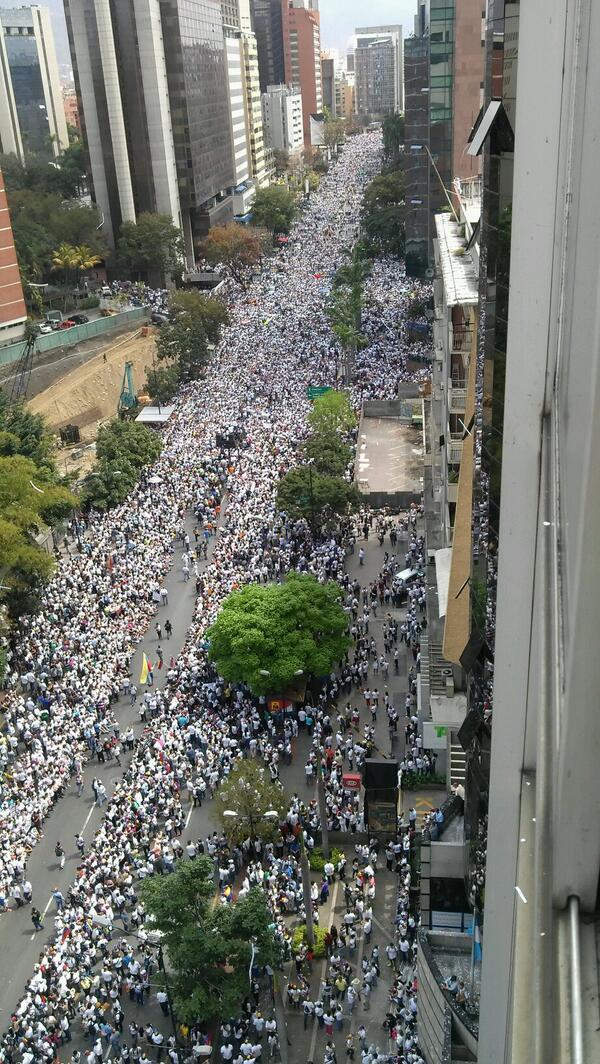There's a tendency, by international journalists covering the current Venezuelan crisis, of projecting own ideological, political and cultural baggage onto their reporting. It is only to be expected and natural, for true objectivity is an utopia. While professional journalists have to maintain an appearance of striving for objectivity, examples of gross subjectivity continue to find their way to media outlets perceived to be editorially objective. I can think of a couple of recent examples: Associated Press and the BBC.
Have a look at the picture below (here a more impressive one):

Does that look like 5,000 people? It did to AP's Venezuela Bureau Chief Joshua Goodman, who after being called on his utterly deficient capacity to estimate crowds, changed the number to 10,000 people.
That wasn't Goodman's only irresponsible bit of reporting. For he came back a few days later to claim that Jimmy Carter had been "a mediator of past political conflict in the deeply polarized South American nation", and added "some members of the opposition harshly criticized the Carter Center for validating a 2004 recall referendum that Chavez won amid complaints that the process leading up to the vote unfairly favored him."
Lost in Goodman's copy were false statements made by Jimmy Carter, in press conference one day after the 2004 recall referendum, about having witnessed final tallying of votes at electoral headquarters in Caracas, only to be refuted, during the same press conference by then OAS Secretary General Cesar Gaviria, who matter-of-factly said that no international electoral observer had been allowed to witness the count by electoral authorities.
Lost in Goodman's report were mentions of the absolute disregard by the Chavez regime of basically all issues agreed upon with the opposition in the "mediation" brokered by Carter.
Equally missing, the now infamous meeting between Hugo Chavez and Gustavo Cisneros, brokered by Cisnero's fishing pal Carter, where Venevision's future was guaranteed, at the expense of editorial independence and RCTV.
So Goodman presents the opposition stance on Carter, implying radicalism, but does not see relevant to explain reasons of such distrust.
Goodman is not alone in this crusade to misinform and misreport what goes on in Venezuela. He has, in fact, very powerful fellow travelers, the BBC being the most important one given its global reach.
Student protests started in San Cristobal, capital city of Tachira state. Under no circumstance can San Cristobal's population be described as mainly middle class. Any person that has visited will agree. The question is: has Goodman visited? Have the BBC reporters visited? If they have, why have they decided to present it as a bastion of the middle class? A bastion of the middle class that elected with 54% of the vote a chavista governor? Why is it lost in their copy the crucial fact about arrested student protesters from San Cristobal having been sent to Coro, nearly 900 km away?
The UK equivalent would be to arrest somebody in London to be sent to a prison in Inverness. How come is this never mentioned? How come Goodman, BBC et al have missed that Coro's prison chiefs, known locally as Pranes, sided with students and guaranteed their lives would be protected?
I guess that would destroy the shared, and preposterous, argument that has it that students are "conservative" in their "outlook" as claimed by the BBC. Imagine that, bosses of criminal gangs that effectively control Venezuela's notoriously hellish prisons giving protection to a bunch of middle class, "conservative" kids. Right...
Then we see how opposition's political dynamics are misreported. Henrique Capriles is goooood. He represents the "moderate" wing. Leopoldo Lopez, Maria Corina Machado and Antonio Ledezma, they are all baaaad. They represent the "radical" wing. No mention of protests having been driven solely by students. No mention of arrest, on trumped charges, of Leopoldo Lopez by the military. No mention of imprisonment of Lopez in a military jail. No mention of conditions of arrest of Lopez. No mention of violations to due process, such as holding audiences in a bus parked outside the prison. No mention of campaign to strip Maria Corina Machado of her parliamentary immunity by the very thugs (colectivos) terrorising and killing innocents indiscriminately and with total impunity. No mention of Maduro's threats to jail democratically elected politicians, as he promised he would do, and did, with Lopez. No mention of statements by chavista Minister of Education saying poor Venezuelans must be kept poor, otherwise they will turn against the 'revolution'. Nada. For none of that goes well with preconceived ideas about what the Venezuelan crisis is all about. It's a bit like what goes in Ukraine: U.S. imperialism = BAD. Russia's imperialism? No word from the left. As NIck Cohen brilliantly explained: "the relativist Western left is interested only in the West, and cannot even think about ‘the atrocities of someone else’." The world must be reminded in every single article, for instance, that Dilma Roussef was tortured. But similar antics, and worse such as sodomizing a student with a riffle or beating partially disabled people, get no mileage at the BBC and AP, nor from utterly hypocritical Dilma, who nowadays claims that Brazil sticks to the principle of non-intervention. As if we didn't know what Lula did in Venezuela in 2002, in Honduras in 2009, or what his resented successor did in Paraguay in 2012.
In the opinion of Goodman et al, what we have here is a government supported by a majority of brown-skinned, poor, disenfranchised people trying to survive a wave of violence, unleashed by a minority of radical, conservative, educated, white middle classes, bent on wresting control through undemocratic means, to then surrender sovereignty to U.S. interests. Never mind the brutality, torture, and assassinations of innocent, and unarmed, students and civilians. Never mind the excessive use of military force to placate peaceful demonstrations. Never mind the presence of a de facto Cuban occupation army. Never mind the fact that chavismo has never won overall control of student and authorities bodies of Venezuelan universities, where voting is still done manually.
Chavismo needs / must advance this notion of it being democratic. Since parts of its discourse marry well with widespread anti Americanism, the BBC, Goodman et al do a fantastic job at misinforming the uninformed and the ignorant. Not only do they misrepresent the crisis, they also misrepresent the parties. No word would be read from this lot on how the "moderate" wing is supported by utterly corrupt chavista bankers and political operatives that are, in no small part, responsible for the current situation, or how Chavismo relies on impossible-to-be-described-as-leftists Boligarchs for many of its deals. However, no amount of manipulated subjectivity passing as objective journalism can win the day against social media. While the reach of BBC and AP is, most certainly, global, it pales next to that of Twitter and Facebook, where the Venezuelan crisis is being reported in real time, unedited, by hundreds of thousands of citizen reporters armed with smartphones. In the days, months and years to come, irresponsible reporting will be taken to task more and more often. Perhaps someone should pass that message to the irresponsible dinosaurs manning editorial desks at AP and the BBC.

